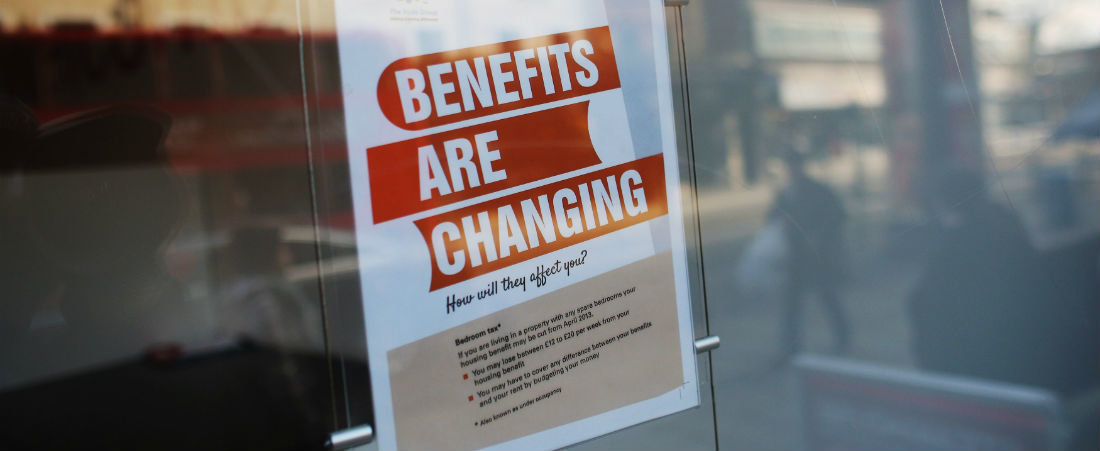![]() Achieved
Achieved
- Unemployment figures falling to 1.96m, the lowest since the financial crash
- The most significant pension reforms for almost a century
- Introduction of a three month time limit before EU migrants can claim benefits
- Annual cap on welfare spending, with a £119.5bn limit next year
![]() More to do
More to do
- Overcoming lingering doubts and problems to achieve any sort of scale on Universal Credit
- Implementing further curbs on migrant welfare entitlement
- A further £12 billion of welfare savings demanded by the Chancellor after the election
![]() The unexpected
The unexpected
- The rapid pace and scale of the fall in unemployment/li>
- Increasing Coalition divisions over further welfare reform, in particular the ‘bedroom tax’
- Labour’s Rachel Reeves’s tough stance on welfare, especially that available for EU migrants
![]() Legacy
Legacy
- Frustrated ambition over Universal Credit
- The lowest unemployment figures since the financial crash and highest employment numbers on record
2014 saw all parties talk tough on welfare, driven by the need both to reduce the deficit and to address voters’ concerns over immigration.
The Government implemented further measures to tighten up access to benefits, coupled with pension reforms and moves to curb ‘benefit tourism’.
Secretary of State Iain Duncan Smith endured a tough year as the government’s flagship Universal Credit program experienced further delays. The scheme, which originally promised to have one million people on board by April 2014, has again had its timetable pushed back, this time to 2018.
Welfare has been a hugely divisive topic in the Coalition with the ‘bedroom tax’ providing arguably the biggest fall out. In September, Liberal Democrat and Labour MPs united to vote on a limit to the scope of the policy. Nick Clegg and Danny Alexander also signalled their opposition to the planned £12bn benefit cuts sought by the Chancellor.
Given these difficulties, many expected the Secretary of State to lose his job in the July reshuffle. However Mr Duncan Smith survived and will plough on with his universal credit mission.
Not all DWP initiatives have foundered. In March, MPs overwhelmingly voted in support of the Chancellor’s plans to introduce an annual limit on welfare spending. Expenditure will be capped at £119.5bn in 2015. While that represents grim news for many, the government has continued to aim to delight pensioners. This year the Chancellor announced the most drastic pension reforms for almost a century. From April 2015, millions of people will be able to spend their pension pot in any way they want, with no requirement on those with defined contribution pensions to buy an annuity, giving retirees far more flexibility.
Indeed, the government has signalled more than one shift in philosophy. The Chancellor’s endorsement of a higher minimum wage in January 2014 was a hint of how the Conservatives – typically averse to labour market regulation – are moving into a preference for making employers give the low-paid more, rather than the government helping them through benefits.
Cutting the deficit hasn’t been the only driving force behind the Government’s welfare crack-down. In the wake of mounting concerns over immigration and UKIP’s growing popularity, the Government has taken a tough stance on ‘benefit tourism.’
New rules on how long EU jobseekers will have to wait to claim benefits came into force at the beginning of the year. EU migrants will now have to wait three months before they can claim benefits and can only claim beyond six months if they have a realistic chance of work. The Prime Minister’s statement of ambition to restrict many benefits for many years after claimants arrive in the UK is first of all an immigration policy, but also sits within a view of what is fair – those who claim should first pay something in.
2014 saw encouraging labour market figures. Unemployment has fallen below two million for the first time since 2008 and employment figures reached a record high of 30.7 million with the ONS stating that 600,000 jobs have been created over the past year. The pace and scale of the Government’s achievement is especially notable when compared to the rest of Europe.
If re-elected in May, the Chancellor George Osborne has announced that he wants to identify a further £12 billion of welfare savings. This will include £3 billion to be raised by freezing working age benefits from 2016. He has pledged that a future Conservative government will reduce the benefit cap from £26,000 to £23,000 and implement further curbs on JSA payments.
Such signals will be heeded by the Opposition, which cannot afford to look soft on welfare. Ed Miliband has committed Labour to a cap on welfare spending and stated that his party would block access to in-work benefits for EU migrants for two years, going one step further than the Conservatives.
After four and a half years of coalition, we have not seen the hoped-for transformation of welfare culture. But a decent British jobs record, coupled with a public mood set strongly against welfare largesse means Mr Duncan Smith has still managed to set the course for the years ahead.






